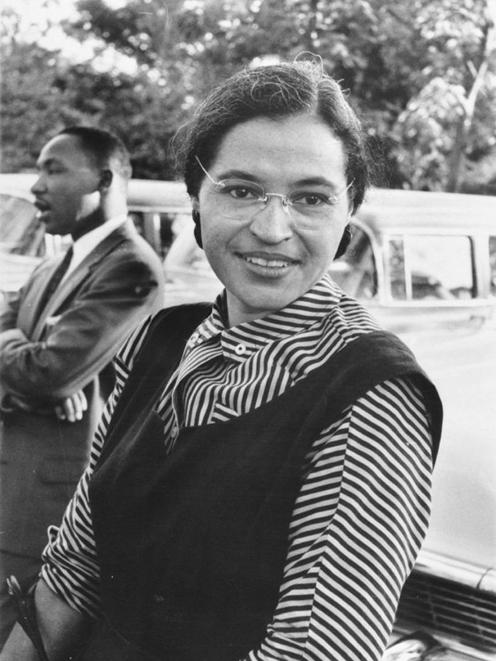
Some people stand up for freedom: Rosa Parks sat down.
On December 1, 1955, in Montgomery, Alabama, Mrs Parks refused to obey a bus driver who ordered her to give up her seat.
When the ''white'' section became full and several white passengers had no seats the bus driver asked Parks and three other people to give up their seats in the ''coloured'' section and stand down the back of the bus.
Mrs Parks refused to get up and was promptly arrested.
On the day she appeared in court, December 5, 1955, the Montgomery Bus Boycott began.
Montgomery's African-Americans boycotted Montgomery City Lines buses for 381 days.
Black taxi drivers charged 10c a ride, equal to the bus fare, in support of the boycott.
Many motorists shared their cars, while some boycotters used non-motorised means, such as cycling, walking, riding mules or horse-drawn buggies.
A young church minister, the Rev Martin Luther King jun, was appointed to lead the boycott, launching his career as a civil rights leader.
A lawsuit was heard in a federal district court which found that Alabama's racial segregation laws for buses were unconstitutional.
The Supreme Court upheld the ruling, and about a year after Mrs Parks' arrest, a court order led the state to desegregate Alabama's buses.
The boycott ended.
Mrs Parks' act of defiance and the Montgomery Bus Boycott became important symbols of the modern Civil Rights Movement.
When she died in 2005 (aged 92), Mrs Parks was the first woman whose remains were allowed to lie in honour in the Capitol in Washington.
Rosa Parks Day today is a good time to consider and celebrate the rights of all New Zealanders to travel free of discrimination.
Here in Dunedin, nobody likes to be called a racist.
Racial discrimination is seen as a grotesque evil.
No-one is suggesting there is racial discrimination on buses, and we would all be justly shocked if there were.
But before we get too joyous at the harmony in which we all live here, it is important to note that all illegal grounds for discrimination listed in our Human Rights Act are held equally unlawful.
We don't force black people to stand down the back of the bus here in Dunedin, but how are we faring on other types of discrimination?
''Low-floor'' technology that makes buses accessible to wheelchair users is now standard throughout New Zealand, which has been a boon not only for disabled passengers but also for parents with prams and anyone with a heavy load of shopping or luggage.
National guidelines specify the dimensions of bus stops and kerbs required for full compatibility with these modern buses, and Hamilton City Council has received a national award for bus stop accessibility.
Sadly our city council has taken the opposite approach, ignoring these guidelines, so our buses often pull up alongside broken or missing kerbs, or are unable to enter bus stops that are too small, or are unable to pull in against a proliferation of poles, signs and litter bins.
Thus our less-agile folk are expected to ''stand down the back''.
National requirements for legibility specify text size and legibility of bus signs so that people with low vision or cognitive impairment can see where an approaching bus is heading, but our regional council ignores these requirements, allowing a clutter of superfluous information in tiny lettering.
So people with reading difficulties are expected to ''stand down the back''.
Six New Zealand bus systems allow all beneficiaries and low-income people to travel on a Community Services Card discount.
Our regional council requires people to walk up to their Stafford St office building, not on a bus route, to apply for a discount, then only allows certain obsolete classes of beneficiary that no longer exist as Work and Income has removed distinctions between eligibilities.
So, on Dunedin's less-than-full buses, many of our poorest passengers don't even get to ''stand down the back''.
The message of Rosa Parks is still relevant here in faraway Dunedin. Discrimination is wrong and illegal whether it is on grounds of race or on any other grounds.
We should not be too quick to congratulate ourselves until our civic leaders have fully grasped the concept of inclusive travel for everyone.
-Peter Dowden is a co-president of Bus Users Support Group Otepoti-Dunedin.
Comments
A good opinion. Please add that one service no longer exists. Anyone who lives on the hillside to Maclaggan, Canongate, Russell, Brown & Duncan Streets or Upper York Place now has a stiff climb to get home from the city. OK for the young and fit? Impossible for the mature, disabled, unwell or parents with babies. Everybody now faces a walk to and from Arthur St Reserve for their nearest bus. Shops, doctors', library, work or study places & pharmacy are no longer easy to access. This is a high density area of city Rise and it has no public transport.











